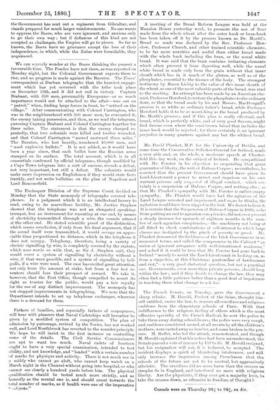The Exchequer Division of the Supreme Court decided on Monday
that the State monopoly of telegraphs covered tele- phones. In a judgment which it is an intellectual luxury to read, owing to its marvellous lucidity, Mr. Justice Stephen showed that the telephone was not an elongated speaking. trumpet, but an instrument for repeating at one end, by means of electricity transmitted through a wire, the sounds uttered at the other end. He stated scientific proof of the distinction, which seems conclusive, if only from his final argument, that if the sound itself were transmitted, it would occupy an appre- .ciable time proportioned to distance, which in the telephone it does not occupy. Telephony, therefore, being a variety of electric signalling by wire, is completely covered by the statute, which uses words so wide that, as Sir J. Stephen said, they would cover a system of signalling by electricity without a wire, if that were possible, and a system of signalling by bell. pulls, if a wire were used. The case has excited great attention, not only from the amount at stake, but from a fear lest in- ventors should lose their prospect of reward. We take it, however, that the Post Office, though compelled to assert its right as trustee for the public, would pay a fair royalty for the use of any distinct improvement. The monopoly has not stopped improvements in telegraphing. We note that the Department intends to set up telephone exchanges, wherever there is a demand for them.


































 Previous page
Previous page